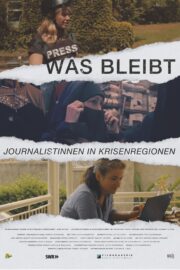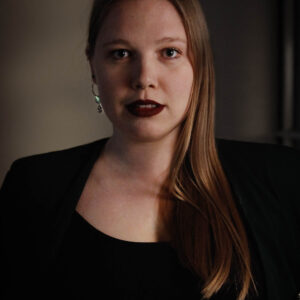What remains - journalists in crisis areas
Images of destroyed houses, crying women and children, injured soldiers – every day we are confronted with such scenes, often feeling overwhelmed. The whole world seems to be in turmoil. The terrible news of our times is on our screens, in newspapers, and on television. But who actually delivers this news? And how do these people deal with it?
The film accompanies three female journalists during their work in crisis areas. India/Afghanistan, Belarus/Ukraine, Uganda/Congo – these are the countries from which these women report. They have to deal with patriarchal structures, dictators, and terrorist organizations. They constantly oscillate between exceptional situations and their private lives. The film asks how the three manage to deal with the experiences they have in their work, how the boundaries between profession and vocation become blurred, and how any sort of breathing space is missing. And to what extent the fact of them being women plays a role in their reports.
Cast
- Silke Diettrich
- Juliane Tutein
- Simone Schlindwein

What remains - journalists in crisis areas
Lotta Pommerien
- Documentary
- Production Country / Year
- Germany 2023
- Language
- dt., engl., frz., uk. OF m. dt. UT
- Format
- DCP, Color, 78min
1.78:1 (16:9), Discrete 5.1
- Original Title
- Was bleibt - Journalistinnen in Krisenregionen
Nominated for:
Granit – Hofer Dokumentarfilmpreis
Director & Crew

Lotta Pommerien
Born in 1996 in Heidelberg. Studied Journalism and Political Science. Worked for television and production companies. Studied Directing at the Filmakademie Baden-Württemberg. Active as a freelance journalist and TV director.
Filmography
| 2018 | 10 Fragen an einen Schlüsseldienst | TV-Beitrag | |
| 2020 | Sonntags extra: Die Mosel | TV-Reportage | |
| Zaungast | TV-Reportage | ||
| 2021 | Mutter sein ja/nein | TV-Beitrag | |
| Sonntags extra: Der Meinradweg | TV-Reportage | ||
| 2022 | Guernseys Kriegskinder | TV-Dokumentation | |
| Wohnen der Zukunft Terra Xpress | TV-Beitrag | ||
| 2023 | Erschöpfung und Depression – wie Post-COVID Sophies Alltag bestimmt | TV-Dokumentation | |
| Wie vom Blitz getroffen – wenn das Schicksal alles ändert + Was Lena nach dem Schicksalsschlag wichtig ist | TV-Dokumentation | ||
| Was bleibt – Journalistinnen in Krisenregionen | Dokumentarfilm | 2023 |
- Music Composer
- Kilian Oser
- Producer
- Lotta Pommerien
- Fabienne Sailer
- Sound Designer
- Timo Kleinemeier
- Stefan Erschig
- Sound
- Moritz Neuschwander
- Editor
- Elena Liv Felderer
- Director of Photography
- Hannah Schwarzl